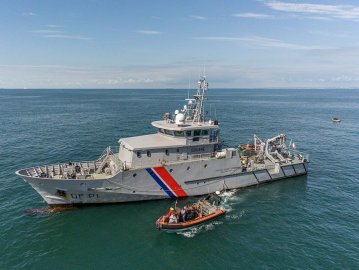France Weighs Sea Interceptions in English Channel Migration Crisis
The English Channel has become a focal point in the ongoing migration crisis, as many individuals from various regions attempt to cross into the UK from France. In response to this growing issue, French authorities are considering implementing sea interceptions to manage migrant flows effectively. This potential strategy comes amidst rising tensions surrounding immigration policies and border security.
The Current Situation in the English Channel
The English Channel has seen a significant increase in the number of migrants attempting to cross in small boats. Many of these individuals are fleeing conflict, persecution, or economic hardship in their home countries. The perilous journey across the channel poses numerous risks, including treacherous waters and the possibility of capsizing.
As the number of crossings rises, so do the challenges faced by both French and UK authorities. The situation has sparked debates over national security, humanitarian obligations, and the effectiveness of existing immigration policies.
Proposed Interception Strategy
French officials are exploring the idea of intercepting boats at sea to deter migrants from making the dangerous crossing. This strategy aims to address key issues, such as:
The concept of sea interceptions raises questions about international law and the rights of migrants. Critics argue that intercepting boats could violate maritime law and the principle of non-refoulement, which prohibits returning individuals to places where they may face harm.
The Role of the UK and International Cooperation
The UK has been a significant player in addressing the migration crisis, but the situation requires collaborative efforts. Both nations must find common ground on immigration policies that respect human rights while ensuring national security. France’s interception proposal has sparked discussions about the need for a joint approach to tackle the complexities of migration across the channel.
To strengthen this cooperation, establishing regular dialogues among various stakeholders, including governments, NGOs, and international organizations, is crucial. This will ensure that any measures taken are effective, humane, and aligned with international standards.
Challenges and Concerns
While the interception at sea may seem like a viable solution, several challenges and concerns must be addressed:
Moreover, the USCIS office locator and similar systems can serve as valuable resources for migrants seeking assistance and information on their rights. It is essential to provide clear guidance and support to those navigating the complex landscape of immigration.
Potential Impact on Future Migration Policies
The conversation around sea interceptions may influence future policies related to migration, both in France and beyond. As nations grapple with increasing numbers of migrants, the need for comprehensive immigration reform becomes increasingly urgent. Policymakers must consider:
The ongoing discussions surrounding sea interceptions reflect a broader trend in immigration politics, where national security concerns often clash with humanitarian obligations.
Conclusion
As France weighs the potential for sea interceptions in the English Channel, the situation serves as a reminder of the complexities surrounding immigration. The balance between ensuring national security and upholding human rights remains a delicate one. Moving forward, it is crucial for both France and the UK to work collaboratively, not only to manage the immediate challenges posed by migration but also to address the underlying issues driving individuals to seek refuge across borders.
Through international cooperation and a commitment to humane treatment, nations can navigate the intricate landscape of immigration and develop policies that reflect both security concerns and humanitarian values. As migration continues to shape global dynamics, the responses crafted today will impact the future of international migration for years to come.










